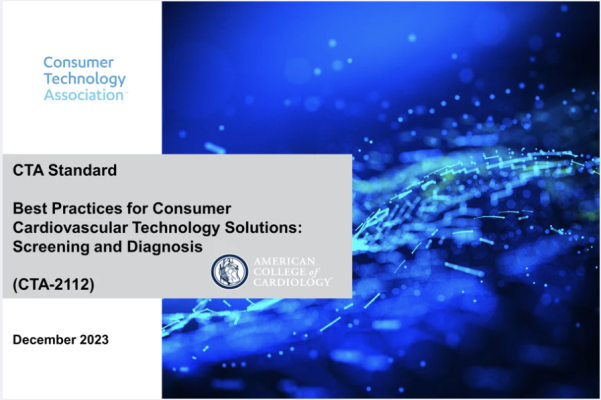
February 7, 2024 — The Consumer Technology Association (CTA) and the American College of Cardiology (ACC) are announcing the release of their second industry framework for the use of consumer cardiovascular technology solutions in the screening and diagnosis for cardiovascular conditions. This new document builds off of the previously published Best Practices for Consumer Cardiovascular Technology Solutions in January 2022.
Cardiovascular disease is the leading cause of death globally, taking an estimated 695,000 lives in 2021 in the United States, about 1 in every 5 deaths, according to the CDC. The U.S. spent about $239.9 billion on cardiovascular disease from 2018 to 2019, including costs from health care services, medicines, and lost productivity due to death.
CTA and the ACC recognize there is strong potential for cardiac monitoring (through Consumer Cardiovascular Technology Solutions) to help identify and screen patients with Atrial Fibrillation (AFib) and related arrhythmias to alert the right clinical groups for early support and reduction in mortality rates.
Best Practices for Consumer Cardiovascular Technology Solutions: Screening and Diagnosis
“Technology is unlocking the potential to detect and diagnose cardiovascular disease earlier and with improved accuracy,” said Kerri Haresign, Sr. Director of Technology and Standards at CTA. “We see an opportunity to address global health care workforce shortages and ensure that the most advanced cardiovascular health technology is available for medical professionals to improve and save lives.”
The framework outlines opportunities for the broader integration of the technology into the workflow for screening and diagnosing cardiovascular disease, using AFib and Hypertension as examples. Additionally, it provides an evaluation criterion including ease of use, retention, adoption, data privacy/security, and collection of clinically relevant data to help users identify the right tools to be selected.
“Our collaborative work on consumer cardiovascular technology solutions highlights our unwavering commitment to redefine the screening, diagnosis, and management of Afib and hypertension, ultimately elevating outcomes for those dealing with these prevalent conditions. As we progress, it is imperative to maintain vigilance, addressing potential pitfalls associated with these solutions. Ensuring the highest quality performance and equitable implementation remains pivotal, allowing us to deliver on ACC’s mission to transform cardiovascular care and improve heart health for all,” said Effie Andrikopoulou, MD, MBA, FACC, ACC Innovation Work Group member.
The project is the second collaboration between the ACC and CTA to develop optimal frameworks for assessing Consumer Cardiovascular Technology Solutions. CTA is collaborating with the ACC to establish best practices for the integration of Artificial Intelligence and digital technology in cardiology.
For more information: www.acc.or


 February 03, 2026
February 03, 2026 









